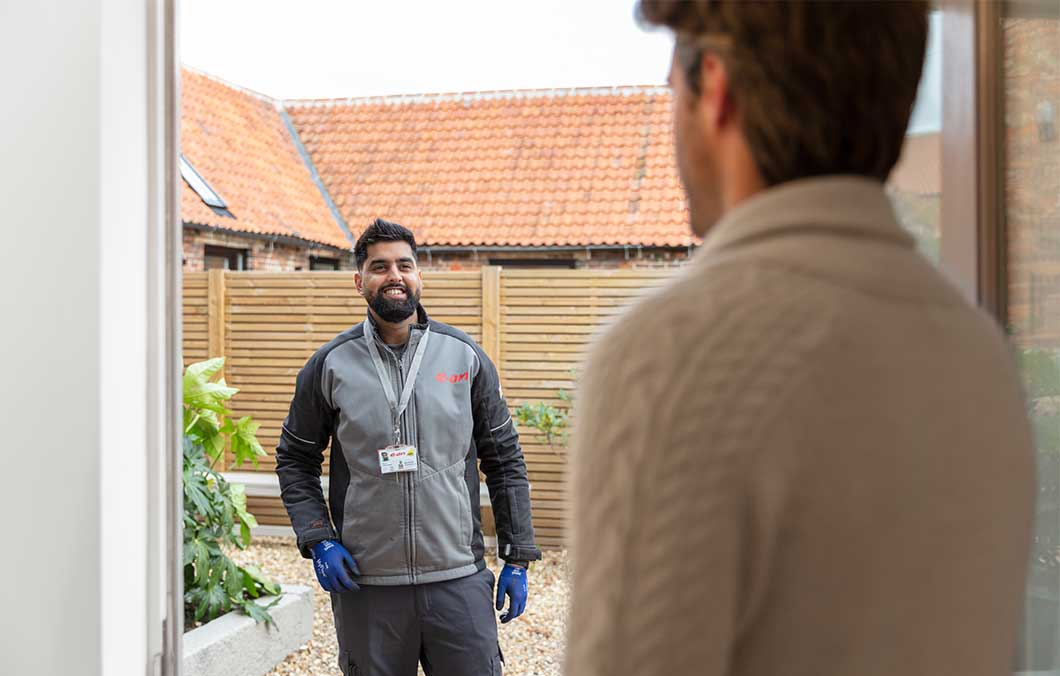Five steps to get an air source heat pump at home
Although air source heat pumps have been around for many years, people are increasingly considering installing one in their home1 to help them become more sustainable, reduce their reliance on gas to heat their homes and help lower their energy costs.




Heat pumps work differently to traditional heating methods such as gas boilers, so having one installed in your home does perhaps need more consideration.
Here we look at what is involved in having a heat pump installed in your home in five steps, from having an initial interest in heat pumps, to being able to enjoy the benefits of having a more sustainable heating source for your home.
1. Do your research
The first place to start when shopping for a heat pump is to find out whether one is right for your home. Although there are a range of heat pumps on the market and a recent Government funded study found that heat pumps are suitable for all property types2, not all homes are instantly ready for a heat pump.
For a heat pump to work efficiently and to its full capabilities, a property must meet certain criteria. These include, your home having an Energy Performance Certificate (EPC) rating of D or above and having adequate levels of cavity wall and loft insulation. If your home doesn’t have these, then it’s recommended you improve the energy efficiency of your home before looking any further into getting a heat pump.
Your home will also require an adequate amount of external space, either on the ground or on an external wall for the heat pump to be located. The size of the space required will vary depending on the type of heat pump, which varies according to your needs. Whatever the size, the heat pump will need to be located in a place with no obstruction to allow for maximum air flow. As well as outdoor space, you will need enough space inside for a hot water cylinder which will need to be installed to provide hot water in your home.
If you’re unsure about whether your home is suitable for a heat pump, an online survey is the best place to start. As part of the survey, you will be asked some simple questions about your home to assess the suitability and the type of heat pump you would need.
2. Speak to a heat pump expert
Once you’ve done your initial research and established that your home could be suitable for a heat pump, the next stage is to speak to a heat pump expert. This will involve a more detailed assessment of your property and the expert looking at the EPC in more detail and confirming which energy efficiency upgrades, if any, you property may need before a heat pump can be installed.
The expert will also discuss the potential benefits of having a heat pump in your home, the costs and the potential savings on your energy bills. You’ll also be able find out more about the technology and how it works at this stage, as well as what will happen during the installation process.
3. Investigate available finance options
The typical cost for a heat pump to be installed in a three-bedroom detached house is between £10,000 - £20,000. The costs include a fully designed replacement heating system – i.e. an air source heat pump, hot water cylinder and new radiators – plus all labour costs to complete the installation.
To help support with the cost of installing a heat pump, the Government has recently introduced the Boiler Upgrade Scheme (BUS). Under the scheme, eligible homeowners will receive a grant of £7,500 towards the cost of a heat pump. Your chosen installer would apply for the grant and then deduct the amount from the final cost.


For those on lower incomes there are additional funding schemes available. Depending on your income levels and where you live in the UK, you may be eligible for a grant or funding as part of one of the energy efficiency support schemes. You can check whether you are eligible for support online.
There are also opportunities to spread the heat pump costs with various finance options. E.ON offers a range of finance options, for example you could pay in full, with an initial deposit, or choose from a range of flexible payments options3.
4. Have a technical survey done in your home
All heat pump installations are bespoke and should be tailored to the individual property and homeowners’ requirements. A technical survey of the property is therefore an essential part of a process for a heat pump installation. As part of the technical survey, a surveyor will visit the property to assess the rooms, take photos and measurements, and speak to the homeowners about their heating habits and requirements.
Following the survey, a personal design for the heat pump system will be created, which ensures the system being installed is the most effective heat pump solution that’s right for the property and the homeowners' needs.


5. The installation
The installation of a heat pump system typically takes two to three days. This can vary depending on the amount of additional work that needs to be done for the new system, such as new radiators or installing a hot water tank.
Whilst installation can be disruptive, it’s important to remember that not only will you have a home that’s heated by a more energy efficient source, but you’ll also have a new up to date heating system and new radiators that can future proof your home. Installations work particularly well if you’re undergoing a renovation project at the same time.
Once the system is up and running, it shouldn’t require much maintenance and should continue to provide heating and hot water for your home for up to 20 years on average. It’s recommended that you service your heat pump annually through a qualified heat pump engineer to ensure it continues to work efficiently for as long as possible.
To find out more about how to begin your journey into having a heat pump installed in your home, helping you to take action for climate, visit E.ON heat pump pages.
1. Homebuilding and renovating: Heat Pumps Demand Has Increased by 312%, Research Shows
2. Energy Saving Trust- From flats to terraced houses: heat pumps are suitable for all property types
3. E.ON Energy Installation Services Limited acts as a credit broker not a lender and work exclusively with Creation Consumer Finance Limited who acts as the lender. Credit subject to status, terms and conditions apply and can be found at eonenergy.com/terms-and-conditions/eon-installation, E.ON reserves the right to amend its finance offering at any time and may withdraw at short notice. E.ON UK plc is an Introducer Appointed Representative of E.ON Energy Installation Services Limited who are authorised and regulated by the Financial Conduct Authority in relation to credit broking services under number 750410. Registered in England and Wales under company number 09965944 with its registered office at Westwood Way, Westwood Business Park, Coventry, CV4 8LG.